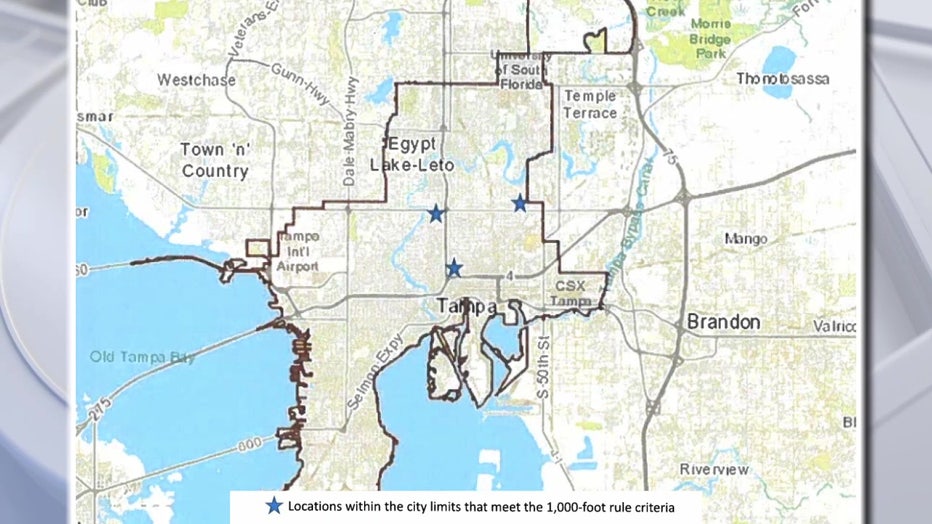Residents want ‘clustered’ sex offenders out of Tampa neighborhood
TAMPA, Fla. - After more than two years of delays, Tampa city council members on Thursday finally received a report on the housing of sexual predators who are currently 'clustered' in the V.M. Ybor neighborhood.
Tampa Police Chief Lee Bercaw said in August that the delays were due to the volume of data and time constraints compiling the report, which was presented by Dr. Bryanna Fox, a professor in the Department of Criminology at the University of South Florida.
The report, which found 1,368 convicted offenders in the V.M. Ybor area, appeared to support a 2008 Hillsborough County ordinance against clustering sex offenders that has long gone unenforced.
The findings also appeared to support arguments from frustrated V.M. Ybor residents, concluding that the practice of clustering sex offenders is ineffective in preventing future sex crimes.
Complaints from residents range from general safety to decreasing property values and a deteriorating historic district.

Kelly Grimsdale has called Ybor City home for more than two decades. In recent years it's also become home to a cluster of registered sex offenders.
"Our neighborhood should not be the one where most of them move to," Grimsdale said.
Public records show as many as 20 registered sex offenders live in three different boarding houses along Nebraska Avenue near 19th Street, but a Hillsborough County ordinance prohibits that and doesn't allow for more than one sex offender to live in a home and doesn't allow any more than 10% of an apartment complex's residents to be sex offenders.
"It is putting a burden on business. We've had some businesses close or businesses can't attract employees," Grimsdale said.
Grimsdale feels they should be more spread out, but according to TPD's report, there are only three areas in Tampa with low income housing that meet the Department of Corrections criteria for where sex offenders can live, leaving many to move into these boarding houses.
The department has identified only three limited areas in Tampa with low-income housing where sex offenders are permitted live due to 1000-foot residency restrictions near schools, parks and other places where children congregate.
In an October 18 letter addressed to council members, V.M. Ybor Neighborhood Association president Kim Headland wrote in part:
"Commencing in 2009-2010, multiple properties on Nebraska Avenue underwent rapid transformations, becoming high-density hubs for newly released sex offenders, predators, and felons. This resulted in a concerning surge in V.M. Ybor's sex offender and predator population. Despite initial opposition, the situation persists, prompting the need for critical intervention.
One glaring issue is the Department of Corrections' ongoing directive to channel felons predominantly into a select few underserved Tampa communities, regardless of their home county or state. Moreover, the current occupancy levels at various rooming houses directly contradict the Florida Fire Prevention Code's "Rooming House" definition (maximum occupancy of 16). Additionally, there is ambiguity regarding the classification of these properties as "hotels/dormitories" as per the Fire Department's current assessment.
READ: Convicted sex offender accused of hiding criminal past with Tampa’s elite pleads guilty
We also note the lack of enforcement regarding zoning codes, life safety, and construction requirements, along with plumbing fixture counts and minimum space allocation per lodging unit. In light of these challenges, we respectfully request the following actions from City Council and the City Administration:
- Engage proactively with the Department of Corrections and FDLE to rectify the systemic practice of disproportionately directing parolees, advocating for a more balanced regional approach.
- Vigorously enforce existing occupancy, building, and zoning codes, adhering to the Florida Fire Prevention Code and City of Tampa Ordinances.
- Ensure strict compliance with life safety and construction requirements as outlined in the Florida Fire Prevention Code and the Florida Building Code for rooming houses (or hotels).
- Enforce the stipulations within city of Tampa ordinances, Chapter19 and 27, encompassing plumbing fixture counts and minimum space allocations per lodging unit.
- Task code enforcement with guaranteeing that property owners providing housing for felons, sex offenders and predators uphold the highest standards of safety, and cleanliness, in accordance with legal requirements."

The report concludes that restricting sex offenders to certain areas does not appear to prevent crime, but that housing restrictions appear instead to "add barriers to successful reentry, increase likelihood of recidivism, do not stop offending (anywhere), and add considerable burden for police (who are already understaffed)."
Thursday city council listened to residents concerns, and as a result, council members agreed to discuss solutions to the issue during a November 30 workshop.
"I'm happy that they're having the workshop because I think nothing was solved yesterday. I really appreciate being listened to, and I appreciate that they gave everyone time to speak," Grimsdale said.


